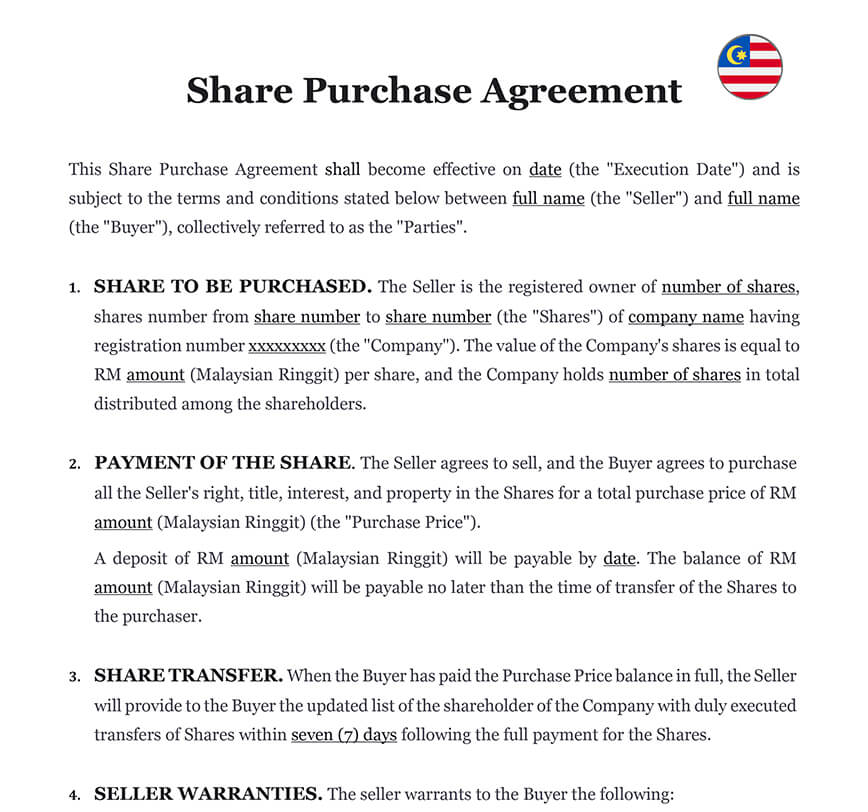Ready to use legal template
Drafted by experienced lawyers
Compliant with Malaysian law
Ready to use legal template
Drafted by lawyers
Compliant with Malaysian law
Home › Business contracts › Share purchase agreement
Learn more about Share Purchase Agreement in Malaysia
A Share Purchase Agreement (SPA) is a legal document entered into by and between a buyer and seller(s) of a target company’s shares, in which the seller(s) agrees to sell a certain number of shares to the buyer for a certain price. The SPA serves to document mutual written agreement on the terms and circumstances of the sale of some or all of a target company’s shares. Assume that a target firm includes its subsidiaries in this article. SPAs are commonly used in mergers and acquisitions when an investor purchases a company whole or substantially. Download our Themis Partner share purchase agreement to sell a certain number of shares in a company at a set price and give proof that the transaction and its terms were mutually agreed upon.
Table of contents
What is a Share Purchase Agreement?
This document is created so that the seller can notify the corporation of his intention to sell his shares to another shareholder or a third party. The terms and circumstances for the sale and purchase of the shares will also be outlined in this share purchase agreement. This is a necessary component for ensuring legal security between the parties. This share transfer is subject to rigorous requirements. The agreement must be in writing, and the transfer can take place only with the assent of the other partners.
What is included in the Share Purchase Agreement?
1. Price adjustments
In most deals, the acquisition price is decided in reference to the most current financial statements of the target. Purchase price modifications often protect a buyer from fluctuations in the target’s worth between the date the target was appraised and the deal closing.
2. Conditions precedent
Conditions antecedent, often known as closing conditions, are criteria agreed upon by the parties that must be met or waived before the purchase may be completed. Conditions precedent are normally assigned to a single party, however some might be applied to both parties.
3. Warranties
In transactions, both parties make representations and warranties to each other about disclosing significant information. While a seller’s representations and warranties are more extensive because they include information about the target company, its business, assets, and liabilities, they can be in the seller’s favor depending on the parties’ respective negotiating power, the nature of the transaction, and the industry.
4. Indemnification
An SPA will often include an indemnity clause that covers liability for damages suffered due to misrepresentations and breaches of warranties, covenants, and other agreements.
5. Termination
Termination rights are linked to closing conditions and allow a party to terminate the SPA prior to closure. Typical negotiated termination rights found in an SPA include, among other things, termination by mutual written consent of the parties or termination due to a party’s breach of a warranty.
6. Confidentiality
An SPA will often include language stating that the provisions of the SPA, including its existence, are considered secret information and should not be divulged to any third party.
- Remarks:
In addition, this section of the SPA should include limiting language about press communications. Unless the parties to the SPA concur, any press releases, public announcements, conferences, or ads pertaining to the transaction, the SPA, or its existence shall be banned.
Why use a Share Purchase Agreement?
A corporation may need to employ an SPA for a variety of reasons. A share purchase agreement can assist a business in raising funds by selling shares to investors. It also enables the organization to tailor its selling to its individual requirements. A SPA, for example, might specify how much money the buyer must pay for each share as well as limits on how and when the shares can be sold.
A SPA can also serve to safeguard the interests of both the firm and its investors. A SPA may guarantee that everyone receives what they want from the transaction by ensuring that all parties understand the terms of the agreement. A SPA can also shield the firm from future litigation by requiring purchasers and sellers to agree to specified terms before any shares are transferred.
What is the Malaysian trading procedure?
Set up a trading account as well as a Central Depository System account with a Participating Organization. You will then work with a licensed dealer or remisier. Give your remisier an order to purchase or sell a certain number of shares of a firm at a certain price. At the PO, your orders are entered into the Automated Trading System. The order confirmation is instantly forwarded to the PO and then to your online trading system.
Orders are automatically matched by the system. All prices at which orders are matched are established by market forces of supply and demand via a bid/offer procedure. A security is sold to the highest bidder and acquired at the lowest offer in every transaction. When an order is matched, a trade confirmation is issued that includes information such as the original order number, stock number, price and quantity matched, and the counterparty PO. In response, the remisier verifies with his client that he has purchased/sold the stated quantity of shares at the stipulated price.
What is Bursa Malaysia?
Bursa Malaysia is the Malaysian capital market’s frontline regulator, with the responsibility of ensuring a fair and orderly market in the securities and derivatives traded through its facilities. Bursa Malaysia, as an integrated exchange, is also responsible for ensuring orderly dealings in securities lodged with it, as well as orderly, transparent, and efficient clearing and settlement processes for transactions cleared and settled using its facilities. In order to carry out these responsibilities, Bursa Malaysia has established a comprehensive and effective regulatory and supervisory structure to govern the market and its players.
What are the transaction costs?
1. Clearing Fees
Novated contract (On market transaction) 0.03% of transaction value (payable by both buyer and seller) with a maximum of RM1000.00 per contract. There is no minimum cost.
Direct business contract 0.03% of transaction value (payable by both buyer and seller), with a maximum of RM1000.00 per contract and a minimum of RM10.00.
2. Buying-in Fees
The Exchange shall levy a fee of 1% of the buying-in contract value in the currency in which the securities are traded against the defaulting Participating Organization. The failing Participating Organization has the right to reclaim such cost from the defaulting customer and is entitled to a 50% refund on such price.
3. Duty Stamp
| ➤ The stamp duty on "shares or stock" is RM1.50 for every RM1,000 (or fractional portion) of the transaction value of securities (payable by both buyer and seller). The stamp duty would be waived up to a maximum of RM1,000 |
| ➤ The stamp duty on "marketable securities" is RM1.00 for every RM1,000 (or fractional portion) of the transaction value of securities (payable by both buyer and seller). The stamp duty will be waived up to a maximum of RM200 |
What is the difference between SPA and Shareholders Agreement?
The Share Purchase Agreement is a legally enforceable contract created to transfer shares from the seller to the purchasers. It is a contract that defines the duties and rights of the firm and its shareholders. The Shareholders Agreement is entered into to establish the company’s and the shareholders’ duties and rights. It is entered into between a corporation and all of its shareholders or between a group of shareholders, whereas an SPA is entered into between a seller and a buyer.
SPECIAL OFFER
Startup
15 Document Package
Essential documents for running your business in Malaysia
Share Purchase AgreementTemplate (.docx)
Save on attorney fees
310 client reviews (4.8/5) ⭐⭐⭐⭐⭐
Share information
Why Themis Partner ?
Make documents forhundreds of purposes
Hundreds of documents
Instant access to our entire library of documents for Malaysia.
24/7 legal support
Free legal advice from our network of qualified lawyers.
Easily customized
Editable Word documents, unlimited revisions and copies.
Legal and Reliable
Documents written by lawyers that you can use with confidence.




